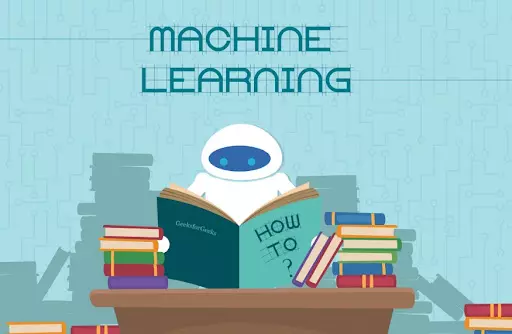
Ever imagined how Amazon or Netflix have recommendations just according to your preferences? How can they be so perfect? That is because of something called Machine Learning. These days Machine Learning is everywhere. Chatbots and predictive text, language translation tools, Netflix recommendations, and how your social media feeds are presented are all powered by it. machine learning course
But what exactly is Machine Learning Course? Let’s find it out
Applied AI
What Is Machine Learning?

Machine learning is a branch of artificial intelligence (AI) that allows computers to learn and improve on their own without having to be explicitly programmed. Machine learning is concerned with the creation of computer programs that can access data and learn on their own.
The learning process starts with observations or data. The fundamental goal is for computers to learn on their own and make them capable of imitating human behavior.
After giving you the most simple definition of ML we could, we would also suggest you dig deeper into the different types of ML. Since ML is everywhere and able to solve certain complex problem statements it would be great for you to understand that different types of ML go behind different applications and programs depending on the functionality.
Types of Machine Learning

- Supervised machine learning is the ones that are trained with labelled data sets which allow the models to learn and grow more accurate over time. They can use labelled examples to apply what they’ve learned in the past to fresh data and anticipate future events. The learning algorithm creates an inferred function to generate predictions about the output values based on the examination of a known training dataset. After enough training, the system can provide targets for any new input. The learning algorithm can also compare its output to the correct, intended output and detect faults, allowing the model to be modified as needed.
This kind of machine learning is used to solve regression and classification problems.

- Unsupervised machine learning is the one in which a program looks for patterns in unlabeled data. Unsupervised machine learning can uncover patterns or trends that individuals aren’t aware of. When the information utilized to train is neither classified nor labeled, they are employed. Unsupervised learning investigates how computers might infer a function from unlabeled data to describe a hidden structure. The system doesn’t figure out the proper output, but it examines the data and can infer hidden structures from unlabeled data using datasets.
These are the ones that solve problems related to association and clustering.

- Reinforcement machine learning is the ones using an incentive system to train machines to do the best action through trial and error. Reinforcement learning can be used to teach models to play games or autonomous vehicles to drive by informing the machine when it has made the correct judgments, allowing it to learn over time what actions to do.
After a quick understanding of the ABC of machine learning, let’s move to what makes ML important and beneficial for EdTech.
Benefits of Machine Learning for EdTech

- Adaptive Learning
Adaptive learning is self-explanatory from the name. It assesses a student’s performance in real-time and adjusts teaching techniques and curriculum as a result of the findings. It aids individualized engagement and attempts to adapt to the individual in order to provide a better education.
The program assists the student in selecting appropriate learning paths. Materials and various learning approaches are suggested to students by the software.

- Increasing Efficacy
Machine learning has the potential to improve the organization and management of information and curricula. It aids in the division of labor and the understanding of everyone’s potential. This aids in determining which task is most suited for the teacher and which is best for the student.
It makes teachers’ and students’ jobs easier, making them happier and more at ease with their studies. This also boosts their enthusiasm for learning and participation. As a result, education will be more efficient.
It also has the potential to increase educator efficiency by handling activities like classroom management, scheduling, and so on. As a result, instructors can concentrate on tasks that cannot be completed by AI and require human intervention.

- Learning Analytics
Frequently, the teacher becomes locked in the classroom as well. As a result, students are unable to comprehend the insights and meaning. The teacher can acquire insight into data and do deep dives into data using learning analytics. She or he can sift through millions of pieces of information, understand it, and draw conclusions from it. This has the potential to improve teaching and learning.
Aside from that, learning analytics recommends paths for the learner to follow. Students can profit from the software’s recommendations for resources and other learning methods.

- Predictive Analytics
In education, predictive analytics is all about understanding students’ mindsets and requirements. It aids in drawing judgments about what might happen in the future. With the use of class assessments and half-yearly results, it is possible to predict which students will do well on the exam and which kids will struggle.
This alerts the instructors and parents, allowing them to take proper action. A student can receive greater assistance and work on his weak subjects as a result of this.

- Personalized and Customised Learning
This is the most effective application of machine learning. It is customizable and individual requirements are being taken care of through this. Students can direct their own learning in this educational paradigm. They can learn at their own pace and choose what and how they want to learn. They can select the subjects that interest them, the teacher from whom they like to learn, and the curriculum, standards, and patterns that they wish to follow.

- Accurately Grading Assignments
Human biases in assessments are frequently cited by students. Educators, for their part, argue that more exact and equitable grading systems are required. Automated test scoring has been around for a while, but putting machine learning into education allows for smart assessments that can rapidly analyze numerous formats, such as papers, essays, and presentations.
Grading software that is cutting-edge can assess style, structure, and language proficiency, as well as evaluate the narrative depth and detect plagiarism. Assessments are reduced to a couple of seconds with machine learning technologies, which provide precise measurement of students’ academic ability while removing the possibility of human error.

- Quick Administration
Machine learning education technology used in an eLearning course can relieve training experts of mundane and time-consuming tasks, allowing them to focus on more creative and gratifying work that requires a human touch. Organizing curriculum, onboarding, providing instructions, scheduling classes, delivering information, and grading are just a few of the tedious but crucial learning management chores that machine learning can handle. Machine learning technology helps educators mentor students and create engaging, meaningful, and up-to-date content by taking over these functions.
Are you thinking if ML is so effective in EdTech then where are the success stories? We have selected a few who made a difference with ML.
Success Stories of ML
Quizlet
Quizlet is a free online learning tool that allows users to make their own quizzes, flashcards, and diagrams, or use pre-made ones. Andrew Sutherland, the company’s founder, came up with the concept in 2005 while studying for a French exam as a high school sophomore. Quizlet now has over 50 million active users and over 300 million study sets on a variety of topics after fourteen years.
Quizlet has a lot of data because of its many users and its content. The startup uses statistics and machine learning to analyze the data and find ways for students to study more effectively.
According to a 2017 study by the corporation, the greatest approach to learning something is to go over it again and again over a long period of time. Many students, however, cram at the last minute.
Quizlet created a Learning Assistant Platform with this in mind, focusing on terms that students are most likely to forget. Quizlet’s Learning Assistant algorithm is used to generate those phrases, and it considers the correctness of responses, the time since the last answer, the time between previous answers, and the study orientation.
The program not only predicts user recall with reasonable accuracy but also emphasises terms that require improvement, allowing students to learn new topics more quickly.
SchooLinks
LOCATION: Austin, Texas
HOW IS IT USING MACHINE LEARNING: Students can use the SchooLinks platform to help them prepare for classes, college, and professions by supporting them with tasks such as creating a résumé, searching for universities, calculating financial aid, and planning what courses to take, among other things. Machine learning algorithms are used to customise the entire experience.
INDUSTRY IMPACT: Katie Fang, the founder of SchooLinks, was recognised in Forbes’ 30 Under 30 list in 2018.
Frequently Asked Question
Q1: What are the basics of the Machine Learning Course?
Machine Learning is an application of artificial intelligence where a computer/machine learns from past experiences (input data) and makes future predictions. The performance of such a system should be at least human level. In order to perform task T, the system learns from the data set provided.
Q2: Is machine learning AI?
Machine learning is an application of AI. It’s the process of using mathematical models of data to help a computer learn without direct instruction. This enables a computer system to continue learning and improving on its own, based on experience.
Q3: Machine Learning Course?
- Machine Learning — Coursera.
- Deep Learning Specialization — Coursera.
- Machine Learning Crash Course — Google AI.
- Machine Learning with Python — Coursera.
- Advanced Machine Learning Specialization — Coursera*
- Machine Learning — EdX.
- Introduction to Machine Learning for Coders — Fast.ai.










